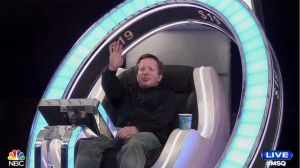 Earlier this month I learned that when a bird poops on you, it really does bring good luck. For over 13 years, one of my most sought after goals has been to become a contestant on a broadcast quiz show. Finally, a couple of weekends ago, that dream was realised. I competed — and won several matches — on the NBC network’s game show, “Million Second Quiz” (MSQ). And it all started with a defecating pigeon.
Earlier this month I learned that when a bird poops on you, it really does bring good luck. For over 13 years, one of my most sought after goals has been to become a contestant on a broadcast quiz show. Finally, a couple of weekends ago, that dream was realised. I competed — and won several matches — on the NBC network’s game show, “Million Second Quiz” (MSQ). And it all started with a defecating pigeon.
Overview: the basic rules of the game
To understand what follows, it will be helpful to have a brief familiarity with how MSQ worked. Admittedly, the rules were complicated and are difficult to explain concisely (which partly explains why MSQ attracted a relatively low number of viewers); but I’ll do the best I can.
The show ran 24/7 over a period of about 11 days, from September 8th through September 19th, 2013, comprising a total of 1 million seconds (hence the show’s name). At the heart of MSQ was its continuous series of 1-on-1 matches, known as “bouts.” In each bout, the contestant who’d won the previous match sat in a seat called the “money chair”; the challenger, who was entering the arena for the first time, stood at a lectern. Each bout lasted for 500 seconds, during which the two opponents were read a series of multiple-choice questions on a wide variety of trivia topics. (Although wide-ranging, the question sets included a heavy concentration of pop culture.) After a question was presented, each player had to push a button corresponding to the letter choice of the answer within 5 seconds; a player would be awarded 1 point for each correct answer. In a typical bout, a total of 14 or 15 questions would be asked. If both players had accumulated the same number of points when the 500 seconds had elapsed, a tiebreaker question was provided. Whichever player buzzed in first on a tiebreaker got first crack at answering it, and if his response was correct he won the match. If he missed, his opponent received an opportunity to answer the question and steal the bout.
If the player in the money chair emerged victorious in the bout, he remained in that seat to take on a new challenger. But if the challenger won, the incumbent was ejected from the money chair (and was finished playing), and the challenger replaced him in it. The money chair displayed a numerical counter that was reset to zero dollars when a new player took his place in it, and increased by ten dollars for each second that a particular player remained in the chair. Thus, if a player went on an extended run of victories, his tally of accumulated money would continue to climb. However, being knocked out of the chair by losing to a challenger would, under most circumstances, cause a player to forfeit all of his accumulated earnings. (Yes, I said “under most circumstances.” I told you the rules were overly complex.) 🙂 After MSQ’s finale this past Thursday night, only the top four players, out of the well over 1,000 contestants who played at least one bout on the show, got to keep their money; the first place finisher also grabbed a sizable bonus and walked away with a total cash prize of over $2.6 million dollars. But most of the participants left with no cash winnings at all, no matter how many bouts they won.
As the 1 million seconds ticked off, most of the bouts were live-streamed over the internet by NBC, literally around the clock. The exception was a small number of bouts that were played on selected nights between 8:00 pm and 9:00 pm, eastern time; instead of being watchable online, those prime-time bouts were broadcast live on network television, and were hosted by Ryan Seacrest. In general, qualifying to play on one of the televised bouts in prime time required winning an insanely large number of live-streamed matches.
Oh, and one other wrinkle: the four people who at any given juncture had accumulated the greatest amounts of money had to live, Big Brother-style, in an apartment in the studio. Because MSQ was sort of a hybrid between a game show and a reality show.
Initial steps of the audition
The casting process employed by MSQ was very different from the mechanism typically utilized by game shows in the U.S. to find contestants. In the usual case, if you wish to land a spot on such a show, you attend an audition — either at the studio where the show is taped, or in one of the select cities at which the producers might hold “traveling auditions” during the course of the year. At that tryout, you’ll submit a written application to provide information about yourself, and you’ll take a written test to show that you possess some baseline level of knowledge in areas relevant to questions that come up on the show. If you do well enough on that screening test, you’ll meet with one or more producers, who will ask you a few questions in an attempt to suss out your personality. You might get a chance to play a simulated and abbreviated version of the show, which gives the producers a chance to project how you would come across to viewers if you were an actual contestant. At the conclusion of the audition (if you’ve gotten this far), your name and dossier will go into a file. Anywhere from several days to many months later (and sometimes more than a full year later), you might then get a phone call from a producer inviting you to travel to the studio to appear on the show. Or — more likely — you may never hear anything further, in which case you would be free to reapply after a designated waiting period.
MSQ, which aired all of its bouts live (rather than taping the action for later broadcast as all other U.S. game shows do), utilized a very time-compressed procedure for deciding who would be tapped to compete. Each day during the 11-day run of the show, the producers held open casting calls (often referred to in the show biz vernacular as “cattle calls”) at the studio. Unlike with most other game shows, the producers of MSQ didn’t spend week or months poring through files of potential contestants. Instead, from each day’s casting sessions, applicants were picked to appear on the show within 24 hours, and would make their appearance without ever leaving the studio after their audition. (A tiny minority of players who made it onto MSQ were picked by other means that aren’t relevant to this narrative.)
On Saturday afternoon, September 14 at about 2:00 p.m., I showed up for one of the daily casting calls at the makeshift studio in the Hell’s Kitchen section of Manhattan that had been converted to be used for the production of MSQ. (I understand that the building formerly served as a Mercedes-Benz dealership.) I’d downloaded the written application from the MSQ website and filled out the questions beforehand. When I arrived at the entrance to the studio, a staffer gave me some additional forms to complete, including one that asked me to list five interesting and unique facts about myself. Of course, when I wrote out my list, both my World Karaoke Tour and this blog were mentioned prominently on it. 🙂
While I was sitting on the sidewalk working on the supplemental forms, a pigeon unloaded some waste product onto my shirt from somewhere overhead. Glancing up, I saw the culprit perched on a ledge that jutted out from the side of the building, several metres above me. Meanwhile, the shirt that I’d be wearing for my interview was now befouled. This presented a problem, as I hadn’t brought any changes of clothing. The security guards who controlled access to the building wouldn’t let me inside to find a sink where I could wash my shirt; I was to proceed through all checkpoints in order, and despite my dirty laundry, no exceptions would be made. Instead, the guards handed me a bottle of water and some paper towels, which I was forced to use outdoors — without a mirror — to attempt to remove the stain. Out, out, damned spot! Not surprisingly under those circumstances, my cleaning job was less than thorough, and some residual avian excrement remained. But it was all good; because, although I didn’t know it yet, this birdsh*t incident would prove auspicious. In any case, I quickly resumed my focus on the task at hand.
Once I’d completed my additional paperwork, I was escorted into the studio. I met with a casting executive who conducted a brief interview with me that was recorded on video. He basically asked me to explain who I am and what I do. Needless to say, the fact that I’ve sung karaoke in 30 countries did not go unmentioned by me. 🙂 At one point, the casting guy asked me to sing a brief excerpt from one of my favourite karaoke tunes. I chose “La Bamba,” which is firmly entrenched on my karaoke A-list. Throughout the interview, I was energetic and enthusiastic. I didn’t have to fake these qualities; if you know me in real life, you know that exuberance is one of my defining characteristics.
My next stop was a room in which I joined a large group of fellow applicants. We were given printouts of the rules to read, plus additional forms to review, complete as necessary, and sign. We were also treated to various briefings regarding legal and related issues. Mostly, though, we did a lot of waiting around, until sufficient space had opened up for us to be herded to the next, and most important, part of the audition process: a suite of rooms officially designated “Area 7,” but which many followers of the show referred to informally as the “holding room.” By the time I was ushered into Area 7, it was nearly 7:00 p.m. — so I’d already been on-site for nearly 5 hours. But although I didn’t know it yet, I wasn’t even close to being done.
Up all night in Area 7
Upon my entry into area 7, a bracelet imprinted with a bar code was placed around my wrist. A staffer then scanned the bar code to clock in the time of my entry. If you think this sounds more like an incarceration than a quiz show application, I won’t argue with you. 🙂
While I was stationed in Area 7, the producers would decide whether to invite me to appear on the show. Trivia quizzes consisting of 17 multiple-choice questions were periodically given to the occupants of Area 7. After a batch of quizzes was scored, staff members would enter to announce which lucky hopefuls had been chosen to move on to Area 8 — a selection that essentially meant becoming a contestant on the show. If, after 10 hours, an applicant hadn’t made the cut, his time in Area 7 came to an end and he was required to go home, although he could return and try again on another day. At one point I actually saw a staff member tap an Area 7 denizen on the shoulder and inform him that he was being kicked out because his 10 hours were up. (Due to our having clocked in via our bracelets, the staff was able to closely monitor how much time each of us had served in Area 7.)
Area 7 consisted of upstairs and downstairs levels, both of which were filled with tables equipped with laptops. When occupants weren’t taking quizzes (in other words, most of the time), we enjoyed unlimited high-speed internet access on those computers. On the walls of each level of Area 7 were large-screen monitors, on which we could watch the bouts that were being played between people who’d successfully advanced to Area 8; and we also each had the option of playing along on one of the laptops via MSQ’s website, which would compare our own success in answering the questions with the actual contestants’ performances. We could also just surf the internet if we wanted to.
The downstairs section of Area 7 (but not the upstairs portion) offered an added attraction: it was one of the sources of the “live feed” for MSQ that NBC was streaming over the internet. Mounted high up on the wall in a corner was a video camera, and during breaks between the contestants’ bouts, the live feed would cut to broadcasts of us in the holding room — so America could look in on the people who were hoping for their own shots at game show glory.
Here’s a screen cap from that live feed, so you can see what the lower level of Area 7 looked like. In this image, I’m standing right below the camera giving a shout-out to my friend Drew, who I knew was watching from his home in Ohio.
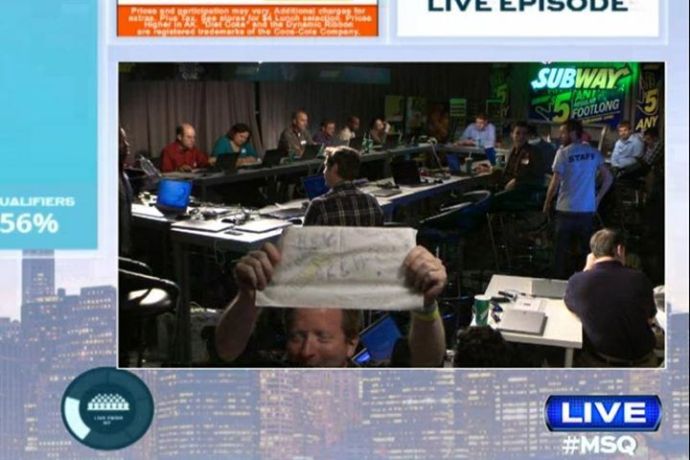
This screen cap of a live internet feed from Area 7 shows me just below the camera, sending a live greeting to my friend Drew.
As you can tell from this screen cap, the fast food restaurant chain Subway was the principal sponsor of MSQ. Not too far from the illuminated “Subway” sign in the upper-right corner of this image was an on-site Subway shop in which the occupants of Area 7 could get free sandwiches made to order. So if you’re wondering what people dined on while logging up to 10 hours in Area 7, the principal answer is: a lot of Subway sandwiches. 🙂 (Other fine comestibles that were made available to us included Twinkies and popcorn. Additionally, the Subway shop closed at 11:00 p.m. and would not reopen until some time after sunrise; but at about 4:00 a.m., the staff did send out for pizza that was offered to all the people who were then in Area 7.)
Of course, if you’re spending hours and hours in the studio and consuming food while you’re there, another bodily need is likely to arise. To enable contestants to address that imperative, a cluster of porta-johns had been set up on the outskirts of Area 7. It was the first time I’ve ever seen porta-johns indoors. Anyway, by the time of my visit, which was about one week into the production of MSQ, the porta-johns were already quite odiferous; reports from friends who passed through Area 7 in the ensuing days indicate that the porta-potties became even more vile as time went on. Notably, inside each porta-john was a sign that read, “ATTENTION This unit is designed for 10 people during a normal work week. Exceeding these limits will result in an unsanitary and overloaded condition.” From what I could tell, each unit was in service 24 hours a day; and when I thought about how many people must be using them during a timespan corresponding to a “normal work week,” it was clear to me that the porta-potties were being taxed far in excess of their intended limits. I tried not to think too much about the “unsanitary and overloaded condition” that was inevitably resulting. Moreover, the sinks in these units lacked the running water that they were supposed to be plugged into, which made it kind of difficult to wash my hands (and would have made it impossible to wash my shirt even if the security guards had granted me access to the building immediately after the birdsh*t incident.) If there hadn’t already been sufficient incentive to make it out of Area 7, the need to find more sanitary facilities surely provided such motivation. 🙂
On the initial quiz that was administered after my entry into Area 7, I got 15 out of 17 questions correct. (The staffers didn’t reveal anyone’s score. However, after the quiz I was able to google the handful of questions as to which I’d been unsure of the correct answer.) Despite this performance, my name was not among those called afterwards to decamp to Area 8. I was aware that quiz results were only one of many factors that the producers took into account in deciding which applicants should become contestants; after all, they were casting a show and needed to maximize its appeal to viewers. Thus, for example, I assumed that they would seek demographic diversity, and that people who were younger or more telegenic would have an advantage. It’s also common for game show casting executives to prefer contestants with outsized personalities or interesting stories to tell (although if such considerations played a role for MSQ it’s not clear why, since most of the participants merely answered the questions in their bouts and were not interviewed on the air at all. America learned nothing about them other than their names, and how well they fared at answering a limited sample size of trivia questions.) For those reasons, I couldn’t have expected to advance to Area 8 based solely on my quiz score. But this knowledge didn’t help when I was passed over, since it implied that my rejection was personal — they didn’t want me. I thought I’d made a good impression during my interview with the casting person, but who knew what was going through their minds?
What happened after my second quiz was similar to what had occurred after the first (namely, that I was once again left behind in Area 7). At this point I’d been in Area 7 for about 5 hours, and I began to wonder whether I would be chosen as a contestant after all. I started to resign myself to the fact that I was stranded in Area 7 limbo.
There came a third quiz; more names that weren’t mine were then summoned to Area 8. Rinse, repeat.
My 10 hour allotment for occupying Area 7 actually expired either before, or shortly after, the staff got around to administering the following quiz. But the staff agreed to overlook the strict time-limit for me, reasoning that it was the middle of the night and no one would care if the 10-hour rule was slightly ignored. Still, I knew that my next quiz — which would be the fourth that I’d taken — would be my last one. Either I would finally get picked to move on to Area 8, or I would be kicked out for sure at that point, with a new day dawning and plenty of eager new auditioners about to make their way to Area 7. (And I was so exhausted that I would have willingly gone home to crash by then anyway.)
It happened! I got to play the game
On my final quiz, I attained a perfect score of 17/17 — the best result I’d achieved on any of the four quizzes I’d taken (although I’d done well on all of them). When the staffers filed in shortly afterwards to read the names of auditioners who’d been chosen to advance further, one of the names they called was “H-Bomb”! Seriously, that’s how they announced that I’d been chosen. Because by then, I’d made it known to the employees who I was. 🙂 (I’d repeatedly urged the staff members to “release the H-Bomb.” On the answer sheets for my quizzes, I’d even been writing “Release the H-Bomb!” in large letters under my name. Of course, it’s unknown what effect, if any, this campaign had upon my eventual selection.)
As you might expect, I was a little excited when my name was called, and I started screaming in exultation. 🙂 The bird really had been a harbinger of good fortune!
At this point, sh*t got real. Before proceeding to Area 8, I had to surrender my electronic devices, as I would be cut off from contact with the outside world for the remainder of my time in the studio. I was now virtually assured of becoming a contestant in the next several hours! (I later heard a report of at least one person who claimed that he advanced to Area 8 but that he was not ultimately given a chance to compete on MSQ. I’m not familiar with his circumstances; but my understanding, based partly on my own observations in Area 8, was that in general, and absent the last-minute revelation of a basis for disqualification from competing, a visit to Area 8 meant becoming a contestant.)
Incidentally, my summoning to Area 8 came at about 6:30 a.m. It was therefore over 16 hours since my arrival at the studio, and I’d been awake all night.
The main part of Area 8 was a tent that served as a green room for contestants waiting for their turn to play. Adjacent to it were smaller tents where I underwent a physical evaluation (which consisted solely of measurement of my blood pressure and body temperature and the taking of my pulse), and a mental health evaluation (which entailed a brief chat with a psychologist). I was also given forms on which I was to disclose relevant information regarding my medical history and regarding my history (if any) of mental health issues. After meeting with me and reviewing my disclosure forms, the physician and psychologist both cleared me to appear on MSQ.
The Area 8 restroom facilities, by the way, were a decided upgrade from what had been available at Area 7. There was a trailer containing flush toilets and working sinks (and the faucets in those sinks had more than ample water pressure). It’s the little things. 🙂 Likewise, the food offerings on a table outside the tent were ample and varied, and I enjoyed a hearty breakfast.
Finally, at approximately 11:30 a.m. on Sunday, September 15, 2013, I was summoned to move along to the set. Some 21 1/2 hours after my arrival at the studio, the time had come for my debut as a quiz show contestant! Incidentally, I hadn’t managed to catch any shuteye while waiting in Area 8; so I’d been awake uninterruptedly since about 8:00 or 9:00 in the morning of the previous day. (I’m a high-maintenance sleeper; no matter how tired I am, I can’t fall asleep if there’s a significant amount of ambient light in the room, or if people are talking in the room. Some of my fellow contestants were able to nap inside the Area 8 tent, but I hadn’t been so fortunate. For similar reasons, I’m never able to fall asleep on airplanes, and when booking hotels I always seek establishments that have blackout drapes in their guestrooms.) Due to my sleep deprivation, I was exhausted. But at that point, my fatigue was greatly exceeded by my adrenaline. I was so ready for this!
Bout 1: I seize the money chair
My first bout, in which I entered as the challenger, pitted me against a man named John who was on a roll and had already won something like 9 matches. He was formidable, and the round unfolded in a seesaw manner. Several questions into the bout, with the score tied, I took the lead by correctly answering the following question while John missed it:
An oenophile loves to do what?
(A) Read Books; (B) Collect stamps; (C) Drink wine; (D) Listen to opera.
I’m not the biggest oenophile myself, but I knew that the word identifies people who love to “drink wine.”
John promptly tied the score on a question from the world of recent cinematic releases:
What actor starred as Andrew Brewster in the 2012 film “The Guilt Trip?” (A) Steve Carell; (B) Paul Rudd; (C) Seth Rogen; (D) Jonah Hill.
Now, I love movies, and I’m a huge fan of Seth Rogen’s brand of comedy; but “The Guilt Trip” is a rare film in Mr. Rogen’s oeuvre that I somehow haven’t gotten around to seeing. (Its dismal 38% fresh rating on Rotten Tomatoes may have something to do with that.) I don’t recall what I answered here, but I know that I chose someone other than Seth Rogen. Thus my lead over John evaporated.
John and I remained tied for a couple of questions after that. We both missed the following one regarding a relatively obscure tourist attraction:
What Florida attraction has underwater performances by women dressed as mermaids?
(A) Cypress Gardens; (B) Circus World; (C) Disney’s Animal Kingdom; (D) Weeki Wachee Springs.
One thing that didn’t help me on this question: I’ve never been to the state of Florida (although that will soon change!). I was blind guessing here. My random guess was “Disney’s Animal Kingdom”; but it turns out that Weeki Wachee Springs is the place where you can observe underwater performances by faux mermaids. Fortunately, John also failed to go with Weeki Wachee Springs. Still a tie score.
I surged back into the lead on a question about grammar:
In the sentence “Answering can be difficult” which of the four words is the gerund?
(A) Answering; (B) Can; (C) Be; (D) Difficult.
I knew that a gerund is a verb form that ends in the suffix “ing,” and that the correct response therefore had to be “answering.” John went with something else.
But John quickly tied up the score again, when I suffered an embarrassing (for me) miss on a geography question. I’m a world traveler; and beyond that I’m always looking at maps when planning trips, and whenever I’m on an airplane I always take some time to peruse the world map in the in-flight magazine. Thus, I’m constantly thinking about what places are located where. But my usual familiarity with the relative geographic positions of various countries was not in evidence when I fielded the following query:
Located in the Indian Ocean, which island is sometimes called the Jewel of the East?
(A) Bali; (B) Palau; (C) Tonga; (D) Vanuatu.
Although I’ve not yet visited any of the four islands listed in those answer choices, I should have realised that Bali (which belongs to Indonesia) was the only answer that made sense. After all, I knew that Palau, Tonga, and Vanuatu were all island nations in the Pacific Ocean, quite distant from where the Indian Ocean would be. But I over-thought the question and inexplicably went with Vanuatu. Fatigue may have contributed to my poor reasoning. John did better on this one and correctly buzzed in with Bali, drawing him even with me in the match.
The score remained deadlocked until the end of the 500-second bout. As time ran out, John and I both correctly responded to the following question:
Roger Wicker is the junior U.S. Senator from which state?
(A) New Hampshire; (B) Iowa; (C) Mississippi; (D) Texas.
John and I both knew that Senator Wicker represents the Magnolia State (Mississippi). And so, with both of us having answered 12 questions correctly during the round, we would proceed to sudden death! One winner-take-all tiebreaker question would determine the outcome of this bout.
The tiebreaker was a math question, and that’s a subject that’s far from my forte; but this one was easy-peasy:
In the mathematical equation 2X + 4 =12 what is the variable?
(A) 2; (B) X; (C) +; or (D) 12.
Both John and I — as well as many fifth-graders, I suspect — knew instantly that in the equation given, “X” was the variable. So it came down to a buzzer battle: whichever player was the first to hit the button corresponding to answer choice (B) would prevail. For all MSQ questions, the buttons were activated as soon as the host had finished reading the question (or at least that’s what I was told during a briefing in the Area 8 tent). So as soon as the host had concluded the reading of the answer choices, John and I each pounded the “B” button on our respective console. When the host announced that I’d gotten in first, both John and I knew that I’d won the bout; it was a given that both players had chosen (B).
Thus, after a hard-fought contest, I took over the money chair! The screen cap at the top of this blog post was created shortly after I assumed my place in that chair.
Bouts 2 through 4: I get comfortable in the money chair
I defeated the first three challengers who faced me, extending my string of victories to 4. Although I saw over 40 questions in those three bouts, one in particular stands out in my memory. It was the very first question in my fourth bout:
“Growing Pains” actor Alan Thicke wrote the theme song for which of these other popular ’80s sitcoms?
(A) The Facts of Life; (B) Cheers; (C) Mr. Belvedere; (D) The Golden Girls.
This was a fun question for me, for several reasons. 1980s pop culture, including sitcoms of that decade (many of which I watched while I was growing up), is a wheelhouse category for me. But the theme song from “The Facts of Life” is especially familiar to me because I sang it at my firm’s summer outing in August 2012! And you can view that performance right here!
If you watch this video, which I uploaded over one year ago, you’ll notice that beginning at the 1:00 mark, a caption reveals the following factoid which I learned while preparing to sing that theme song: “It was written by Alan Thicke and originally performed by Gloria Loring.” So, yeah, there was no way I was going to miss a question asking which sitcom’s theme song had been penned by Alan Thicke, given that “The Facts of Life” was one of the choices. 🙂
Bout 5: Easy come, easy go
My opponent in bout number 5 was a man named Tom. Like most of my bouts, this one was tight the entire way.
Tom and I each answered the first two questions correctly. I stumbled on question no. 3:
Which song by the Backstreet Boys was subtitled “Backstreet’s Back”?
(A) Larger than Life; (B) Everybody; (C) Shape of My Heart; (D) I Want It That Way.
My problem was that “I Want It That Way” is the only Backstreet Boys song that I know. I didn’t help myself by guessing that particular song as the answer to the question. Having sung it a number of times at karaoke, I was pretty sure that it didn’t have a subtitle — so I should have ruled it out right away. I don’t know what I was thinking. If I’d randomly opted for one of the other choices, I would have had a 1-in-3 chance of nailing this question on a lucky guess. Regardless, Tom did get it right, and he took a 3-2 lead.
After 7 questions had been asked, I still trailed by 1 point, 7-6. I pulled even on an architecture question:
The Walt Disney concert hall in Los Angeles was designed by which architect?
(A) Frank Gehry; (B) I.M. Pei; (C) Philip Johnson; (D) Frank Lloyd Wright.
It just so happens that I had previously posted a photo of that building on this blog. 🙂 And if you click on the link in the preceding sentence, you’ll see that in the caption underneath that photo, I’d written, “The Walt Disney Concert Hall, in downtown Los Angeles, was designed by superstar architect Frank Gehry.” 🙂 This question was, therefore, a slam-dunk for me. Also, architecture is a passion of mine in general, so this was exactly that type of question that I needed to draw when I was attempting to make a comeback. I locked in my response of Mr. Gehry, while Tom went for Mr. Pei. The bout was once again deadlocked.
But that tie was short-lived. Soon after, with the score tied at 8-8, came the fateful question that would ultimately decide the bout:
Which Baldwin brother appeared on “Celebrity Rehab with Dr. Drew”?
(A) Daniel; (B) Stephen; (C) William; (D) Alec.
If only I’d blogged about the Baldwin brothers. 🙂 I had absolutely no idea on this question, although, of the four siblings, Alec seemed unlikely to have ended up in rehab. Beyond my belief that I could eliminate Alec, I was taking a shot in the dark. I guessed William, but the answer — which Tom correctly chose — was Daniel.
Tom had reassumed the lead, 9-8, and he wouldn’t look back the rest of the way. There was one more question that he and I both missed:
What company owns the Wonka brand of candy?
(A) Hershey; (B) Mars; (C) Nestlé; (D) Cadbury.
Uh-oh. I didn’t know there was a Wonka brand of candy. Tom and I both guessed Hershey, but it turns out that the Wonka brand of confections is owned by Nestlé. Who knew? So this question was a missed opportunity for me, although I don’t feel too badly about it because it’s simply something that I didn’t know.
Neither Tom nor I missed any questions after that. I therefore ended up losing to Tom by 1 point, 13-12; overall, I got a total of 3 questions wrong in the bout while my opponent missed 2 questions. Tom deserves a lot of credit for playing such a strong game and giving me so little margin for error. Mostly, I blame my loss on the Baldwin brothers. 🙂
After I shook Tom’s hand and departed from the set, a producer who told me that she’d enjoyed watching me conducted a brief videotaped exit interview with me. However, that interview will probably never be watched by anyone who wasn’t in the studio on that day. I then retrieved my cellphone and Kindle, and was finally released back into the world.
Here are screen caps from some of my bouts on MSQ. They were provided by Drew Scheeler (the aforementioned “Drew who . . . was watching from his residence in Ohio”).
Although I was knocked out of the money chair sooner than I would have desired, my experience on MSQ was still nothing but fun. Well, at least that was the case once I got onto the set; staying up all night in Area 7 was not my most enjoyable activity ever. 🙂 But even that grueling ordeal was sort of worth it, in light of the end result.
I also want to stress that all of the MSQ staff members with whom I interacted were nice to me and treated me well. Given the demands of a show that operated 24 hours a day, those staff members were required to work crazy hours for a period of about two weeks. I’m very appreciative of their efforts. Also worthy of gratitude are the people who served as hosts during my matches: Todd Alan Crain, who read the questions during my first four bouts, and Christy Newsom, who did the same during my fifth bout. Both Todd and Christy did an outstanding job despite having to perform their hosting duties for long hours during the run of MSQ; and they deserve more high-profile gigs in the future. And I’m not only saying that because they told me I was one of their favourite contestants. 🙂
One disappointment about my MSQ appearance: for reasons known only to themselves, the show’s producers refused to refer to me as H-Bomb during my bouts. They insisted on identifying me only by my actual name of Harvey. Even the hosts would have preferred to honour my wish and call me H-Bomb; in a comment on my Facebook page, one of the hosts later wrote, “We REALLY fought hard to call you H-Bomb. I even asked the producer if I could call you H-Bomb as you were leaving and he said no. The whole crew was calling you H-Bomb and actually made name tags for each other out of tape. Everyone became J-Bomb, D-Bomb, etc.” (Several days after my own appearance, the producers did allow a contestant named Bob to be addressed by the hosts, and identified onscreen, as “Yobob.” No explanation was given for this double-standard regarding the use of nicknames. Yobob may be a cool guy, but so am I. :))
Many people have asked me how much money I won as a result of my victories on MSQ. The answer, as you may have deduced from my description of the rules above, is: zero dollars. During my tenure in the money chair, I accumulated hypothetical earnings of $29,967; but like I said, the vast majority of folks who appeared in the money chair didn’t retain any of their winnings once they got eliminated. I fell into that vast majority. However, I didn’t leave the studio empty-handed! For my troubles, I was awarded a $5 gift card from the Subway sandwich chain. Paltry though its value may be, that gift card does still count as my first-ever game show winnings! 🙂
I’m okay with my lack of monetary remuneration for my MSQ success; the exposure, and the chance to prove that I could get onto a quiz show and win, mean just as much to me as any pecuniary gain would have. Okay, I’m lying. While those other benefits have value to me, they don’t completely substitute for the cold hard cash that I would have liked to garner. Still, there’s nothing I can do about it. I’ll just have to get onto another quiz show where I can seek to become more appropriately compensated for my trivia skillz. 🙂 This is only the beginning!
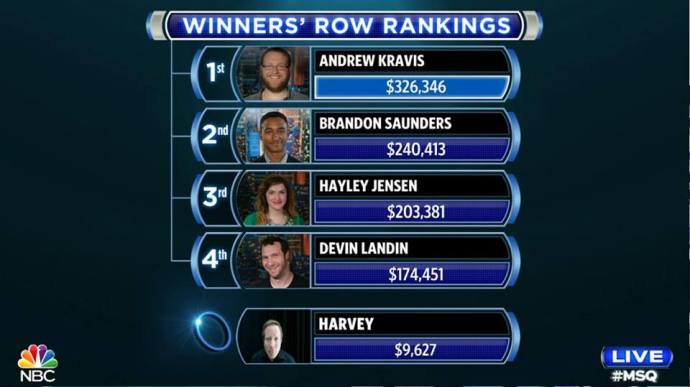
This screen cap taken from NBC’s webcast at an unknown moment during my bouts shows how the monetary standings appeared at that point. As you can see, I was far behind the amount of money I would have needed to be in contention for a slot in the top four (and only by finishing in the top four would I have been able to take home a cash prize from MSQ).
Would you like to compete on a quiz show?
Click here to follow me on Twitter! And click here to follow me on Instagram!
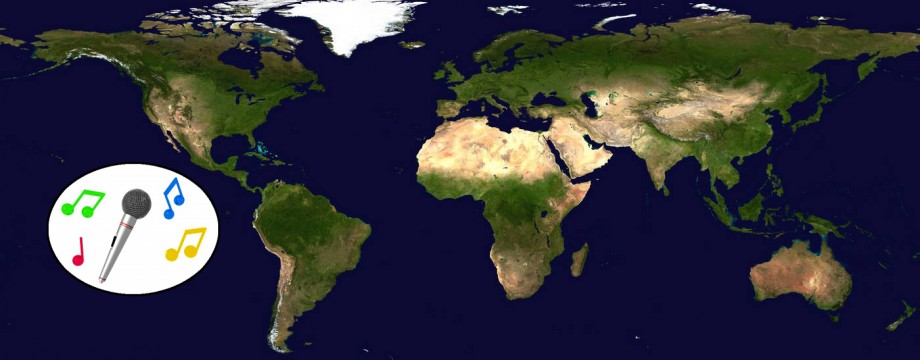
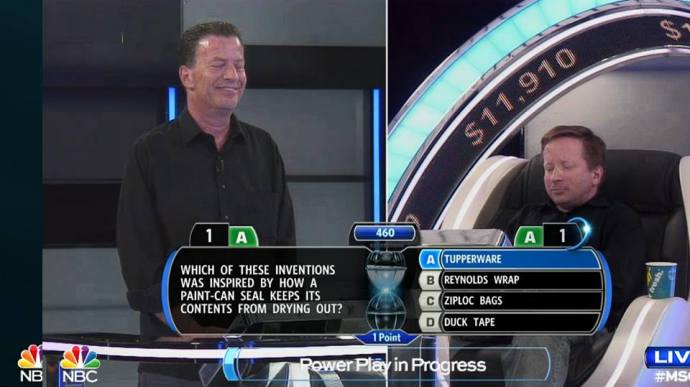
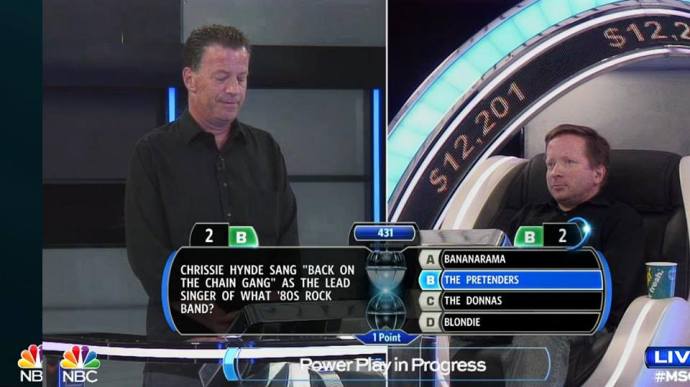
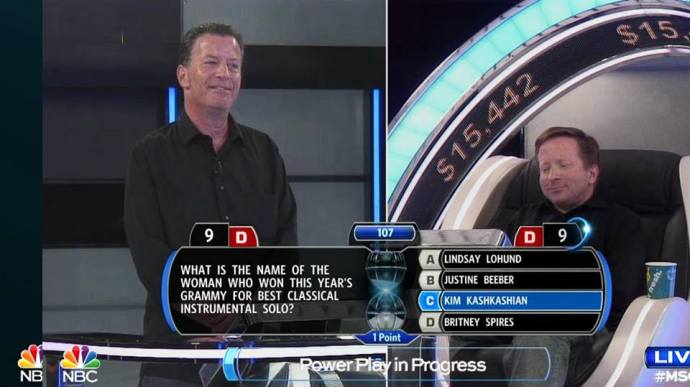
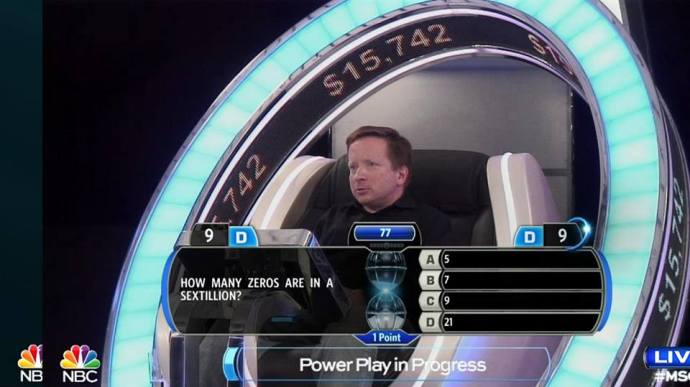
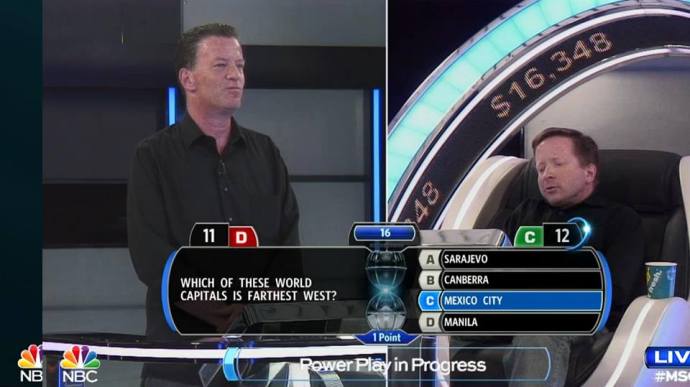
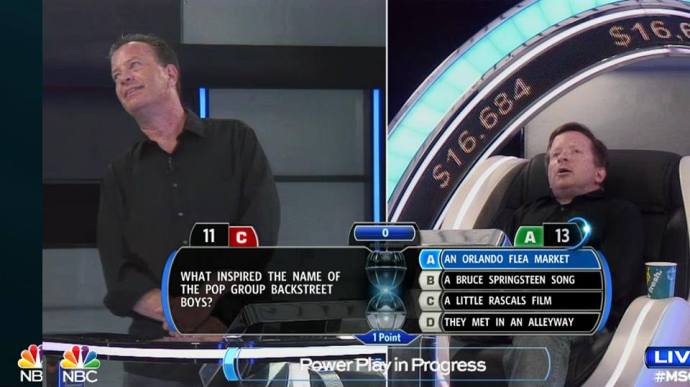
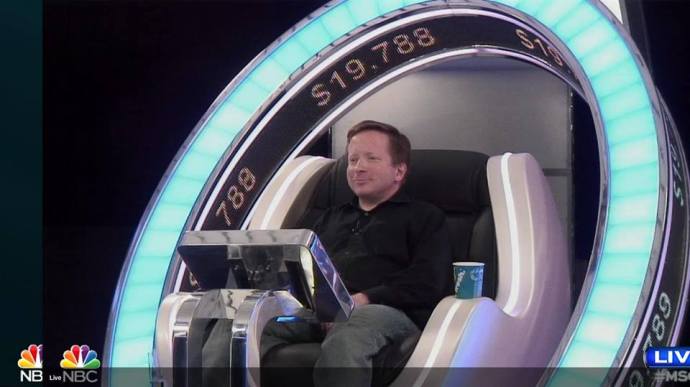
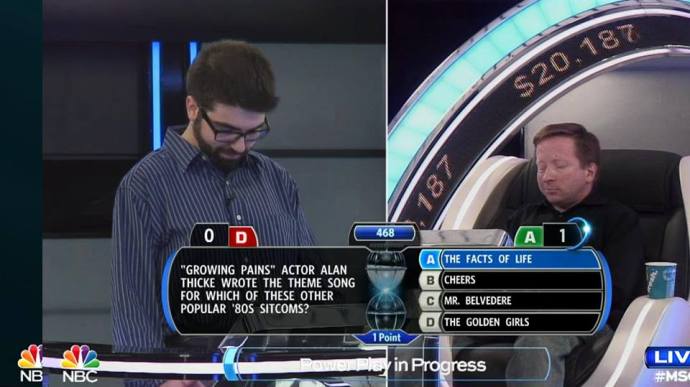
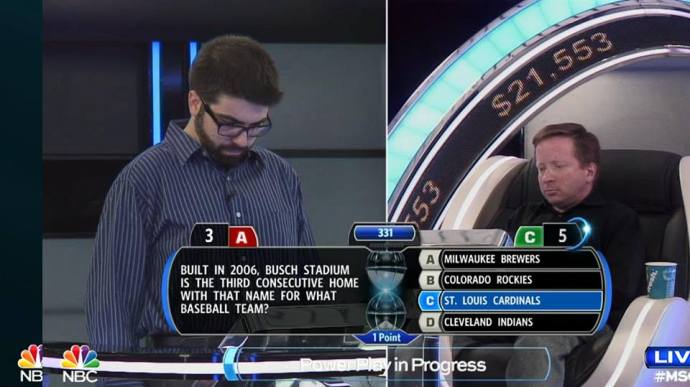
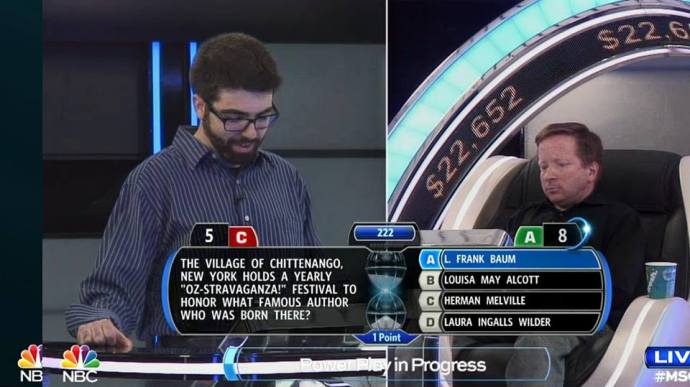
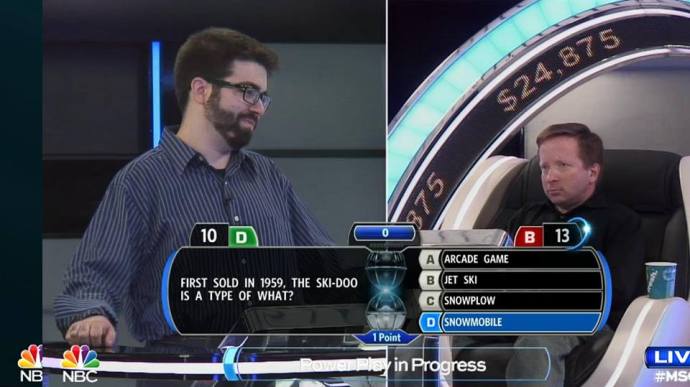
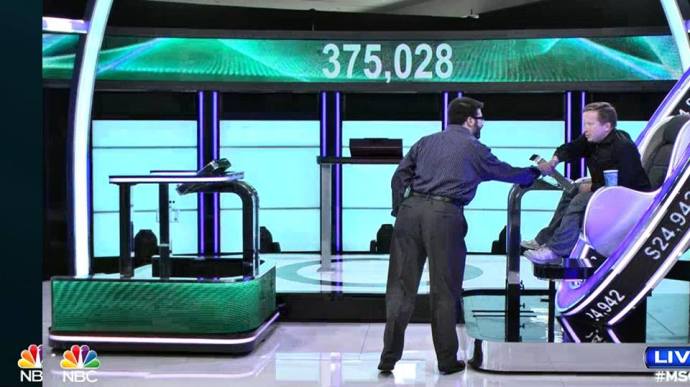
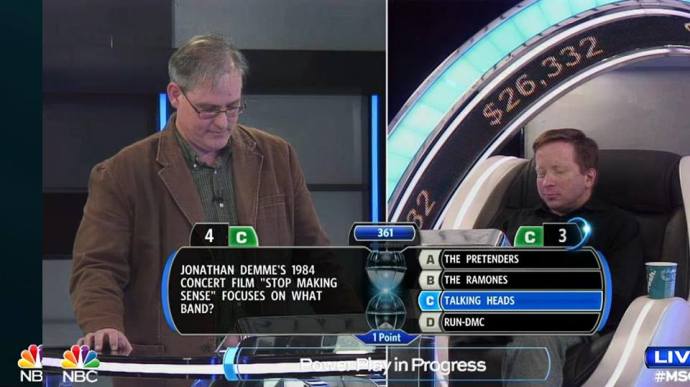
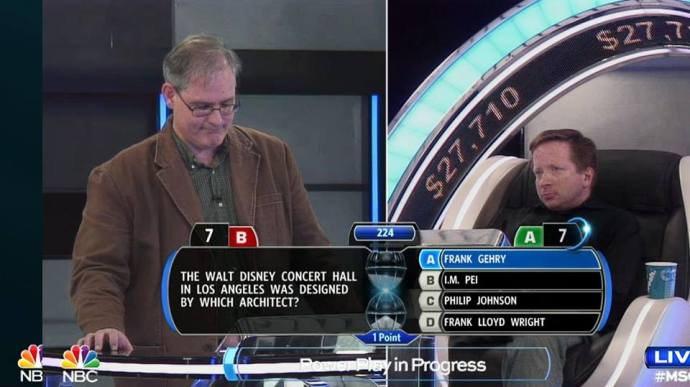
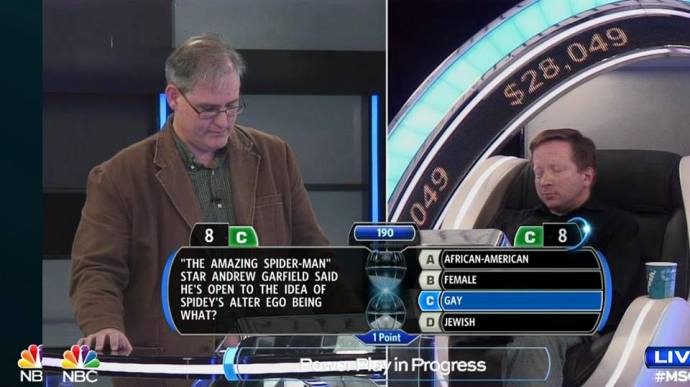

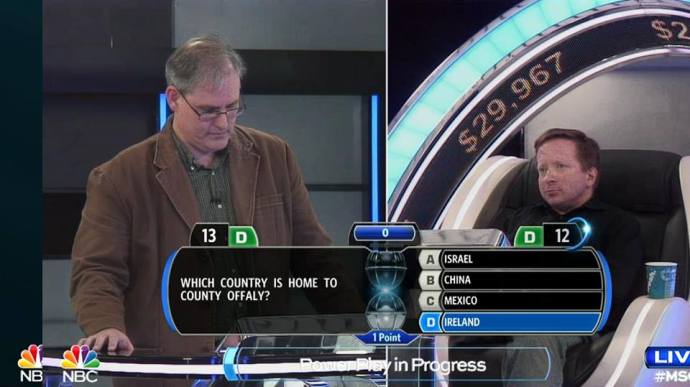



First of all, this blog post needed more mentions of me BY NAME! I understand your mention of Drew…a friend who lives in OHIO and happened to be watching ONLINE. But I was there! I was PART of your story. I read the first 8 questions you mentioned in this blog, and yet…NOTHING. No mention of the fact that I read your first four bouts (consisting of at least 60 questions) and Christy and I were SURE you were going to make it to the prime time show. NOTHING?! H-Bomb, I thought our bond was stronger than that. If my omission has something to do with the horrible conditions that you endured during your stay, that’s NBC’s place to apologize…they won’t, by the way–they’re still trying to figure out what went wrong. You and I spent the most important hour of your life together (after all, it was the basis for this post), and yet, I was just referred to by you (and NBC) as “the host.” Devastating and humiliating. I expect another post fully dedicated to our time together.
LikeLike
@Todd: Although this article is already over 6,000 words long, I did sense that it was somehow incomplete — but I couldn’t quite put my finger on what was missing. So thank you for alerting me to this glaring omission. I will revise this post forthwith to correct the injustice that I have done to you and Christy. 😀 I hope that in time, you will be able to get over the pain.
By the way, I don’t seek an apology from NBC; they were nice enough to put me on the show, after all, so it’s hard for me to be too upset with the Peacock Network.
LikeLike
Justice has been served.
LikeLike
I can hardly believe you knew the answers to all those questions…wow. And that bathroom situation sounds awful. It sounds like you had a lot of fun despite the pigeon and stinky bathrooms, though. 🙂 What an experience to remember!
LikeLike
@Jenna: Thanks, although I still can’t believe I got the Bali question wrong. Yes, I did have a lot of fun. Maybe all of my travels, and my experience at enduring redeye flights and jetlag (as well as putting up with unsanitary lavatories on some of those flights), helped prepare me for the stamina that was required. 🙂
LikeLike
Sounds like a blast. I wish I could’ve been there, but there’s no way I would have gotten as far as you. I’m lousy at the kinds of questions they ask on these shows. So now I know two people who have been on TV. (The other was an uncle who was on Wheel Of Fortune. He won one round and earned just about enough money to cover the hotel and airfare needed to travel to Los Angeles, where they do the show.)
LikeLike
@David: I wasn’t on TV, I was on a live web feed on NBC.com (only the prime-time matches hosted by Ryan Seacrest were on TV). It was a blast . . . and at least I didn’t go out of pocket too much on my cab rides to and from the studio, so the lack of winnings to cover my costs wasn’t a big deal.
LikeLike
Okay…first of all, loved watching your performance of Facts of Life! First time I’ve heard you sing!!! And second of all, how lucky were you to get attacked by that NYC pigeon?! And finally…you are the king of trivia! So impressed that you were able to answer all those questions! What a very cool experience, and such a fun read!!!
LikeLike
@Jess: Wait a minute. The principal focus of this website is my World Karaoke Tour, and on this site you can find numerous videos of me singing in locations around the world — and yet you’d never heard me sing before today? We need to do something about that. 🙂
Secondly, I’ve lived in NYC since 1995, and a pigeon had never done that to me before, which frankly surprises me. But when it finally happened, it sure came at a good time. 🙂
And thank you. I wish I’d been able to correctly answer at least one more question, though (the one about the Baldwin brothers), because then I would have had the chance to play for a bit longer (although first I would have had to get by another tiebreaker question) . . .
LikeLike
You have to warn me next time not to read your blog after hours when beside a sleeping husband. I fought so hard not to laugh out loud reading how you were defecated on by an NBC peacock, oops, I mean an NYC pigeon, and your attempt to remedy the shituation.
Despite missing the above-mentioned questions, your variety of knowledge is astounding smarty-pants : )
“Wow” is about all I have to say about the substandard facilities provided in holding tank 7. NBC, I’m embarrassed for you.
LikeLike
@WCBFF: You mean your husband didn’t want to read this article with you? 🙂
Regarding the facilities at Area 7 . . . some have speculated that the reason for this was that MSQ was intended to be an endurance contest, and not a mere trivia competition. That’s also why some contestants had to play their bouts at 3:00 or 4:00 in the morning, and why some (like me) were kept up all night in the holding cell. The need for Area 7 occupants to deal w/ the Porta-Johns could have been just one more way that NBC was trying to keep it real — perhaps bringing this hybrid game show / reality show a little closer to “Fear Factor.” 🙂
LikeLike
I think they were just being cheap.
LikeLike
Great post, H-Bomb! Thanks to you, I get to see what I looked like on the webcast finally, no one I know got to see me that day! Thanks for the kind words, you were a fierce competitor.
LikeLike
@Tom: Thank you, and back at you — you were a tough opponent (obviously), and I wish I hadn’t had to go up against you as soon as I did. And yeah, it’s unfortunate that due to the need to check our phones and the way things worked in Area 8, contestants were unable to get out a heads-up to friends or loved ones to let them know what time they would be appearing. I’m glad that at least you were now able to see the screen shots.
LikeLike